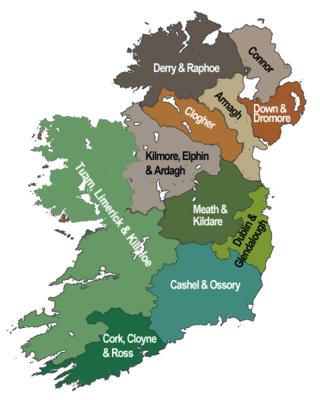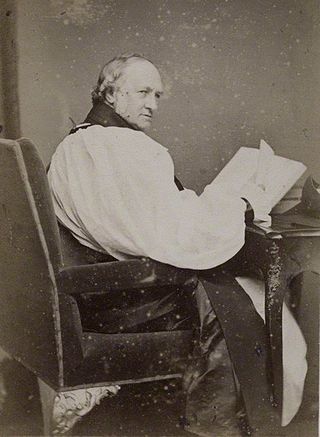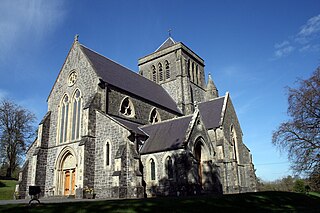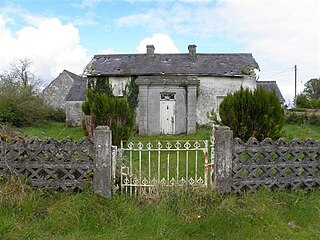
The United Provinces of Armagh and Tuam, commonly called the Province of Armagh, and also known as the Northern Province, is one of the two ecclesiastical provinces that together form the Anglican Church of Ireland; the other is the Province of Dublin. The province has existed since 1833, when the ancient Province of Armagh was merged with the Province of Tuam. The Archbishop of Armagh is its metropolitan bishop.

The Diocese of Kilmore is a Latin Church diocese which is mainly in the Republic of Ireland although a few parishes are in Northern Ireland. It is one of eight suffragan dioceses which are subject to the Metropolitan Archdiocese of Armagh.
Hugh O'Reilly was an Irish prelate of the Roman Catholic Church. He served as Bishop of Kilmore from 1625 to 1628 and Archbishop of Armagh from 1628 to 1653.

Marcus Gervais Beresford was the Church of Ireland Bishop of Kilmore, Elphin and Ardagh from 1854 to 1862 and Archbishop of Armagh and Primate of All Ireland from 1862 until his death.

Horringer, formerly also called Horningsheath, is a village and civil parish in the West Suffolk district of Suffolk in eastern England. It lies on the A143 about two miles south-west of Bury St Edmunds. The population in 2011 was 1055.

John Richard Darley, a "man who laboured strenuously to awaken and sustain the practical interest of the clergy and laity", was a 19th-century Irish Anglican bishop.
Nicholas Bernard was an Anglican priest and author during the 17th century. A dean in Ireland at the time of the Rebellion of 1641, he wrote descriptions of current events. He was also the biographer of James Ussher.
John Leslie was a Scottish Cavalier and Church of Ireland bishop of Clogher, who became known as the "fighting bishop" for his resistance, first to the Irish clans of Ulster during the Rising of 1641 and then to the New Model Army during the later Cromwellian conquest of Ireland. He is also notable for almost reaching the age of 100.
Kilmore is a civil and ecclesiastical parish of County Cavan in Ireland. It is located about 3.5 miles (5.6 km) south-west of the county town of Cavan.
The Reformation in Ireland was a movement for the reform of religious life and institutions that was introduced into Ireland by the English administration at the behest of King Henry VIII of England. His desire for an annulment of his marriage was known as the King's Great Matter. Ultimately Pope Clement VII refused the petition; consequently, in order to give legal effect to his wishes, it became necessary for the King to assert his lordship over the Catholic Church in his realm. In passing the Acts of Supremacy in 1534, the English Parliament confirmed the King's supremacy over the Church in the Kingdom of England. This challenge to Papal supremacy resulted in a breach with the Catholic Church. By 1541, the Irish Parliament had agreed to the change in status of the country from that of a Lordship to that of Kingdom of Ireland.

The Kingdom of East Breifne or Breifne O'Reilly was an historic kingdom of Ireland roughly corresponding to County Cavan that existed from 1256 to 1607. It took its present boundaries in 1579 when East Breifne was renamed Cavan, after Cavan town, and shired into Ulster. Originally part of the older Kingdom of Breifne, East Breifne came into existence following a protracted war between the ruling O'Rourke clan and the ascendant O'Reillys which culminated in the division of the kingdom in 1256. The Kingdom was ruled by the dynasty of the Ó Raghallaigh (O'Reilly) and lasted until the early 17th century.

Drumlane is a townland situated near the village of Milltown, area 85.76 hectares, in County Cavan, Ireland. Drumlane is also the name of the civil parish in which the townland is situated. Saint Columba brought Christianity to Drumlane in 555, and Saint Máedóc of Ferns was the founder of an early Drumlane monastery. Saint Máedóc made the Connachta nobleman Faircheallaigh the first Abbot of Drumlane at the end of the sixth century and his Ó Faircheallaigh descendants became historically the Erenagh Abbots of Drumlane. The name Drumlane denotes the drumlin region of low hilly ribbed moraines formed over a limestone bedrock created by the movement of glacial ice and melt water during the last ice age. Several townlands in the neighbourhood are prefixed with the word 'Drum' ('Droim'), while several others are prefixed with the word 'Derry' ('Doire'), which is Irish for oak.

William Sheridan was a 17th-century Irish clergyman, who was Bishop of Kilmore and Ardagh between 1682 and 1691, having previously served as Dean of Down from 1669 to 1682.

St Fethlimidh's Cathedral, Kilmore is one of two cathedral churches in the Diocese of Kilmore, Elphin and Ardagh in the Church of Ireland. It is situated in the parish of Kilmore, southwest of the county town of Cavan. The name Kilmore - Cill Mhor meaning 'the great church' - reflects an earlier prominence that the Annals of the Four Masters have traced to an early medieval foundation. Of that church there are no physical remains
Henry Jones was the Anglican Bishop of Clogher and Bishop of Meath.
Thomas Price (1599–1685) was the Church of Ireland's Archbishop of Cashel.

The Archdeacon of Ardagh was a senior ecclesiastical officer within the Anglican Diocese of Ardagh. As such he was responsible for the disciplinary supervision of the clergy within the Diocese.

Carn is a townland in the civil parish of Kildallan, barony of Tullyhunco, County Cavan, Ireland.

Ardue is a townland in the civil parish of Drumlane, Barony of Loughtee Lower, County Cavan, Ireland.










